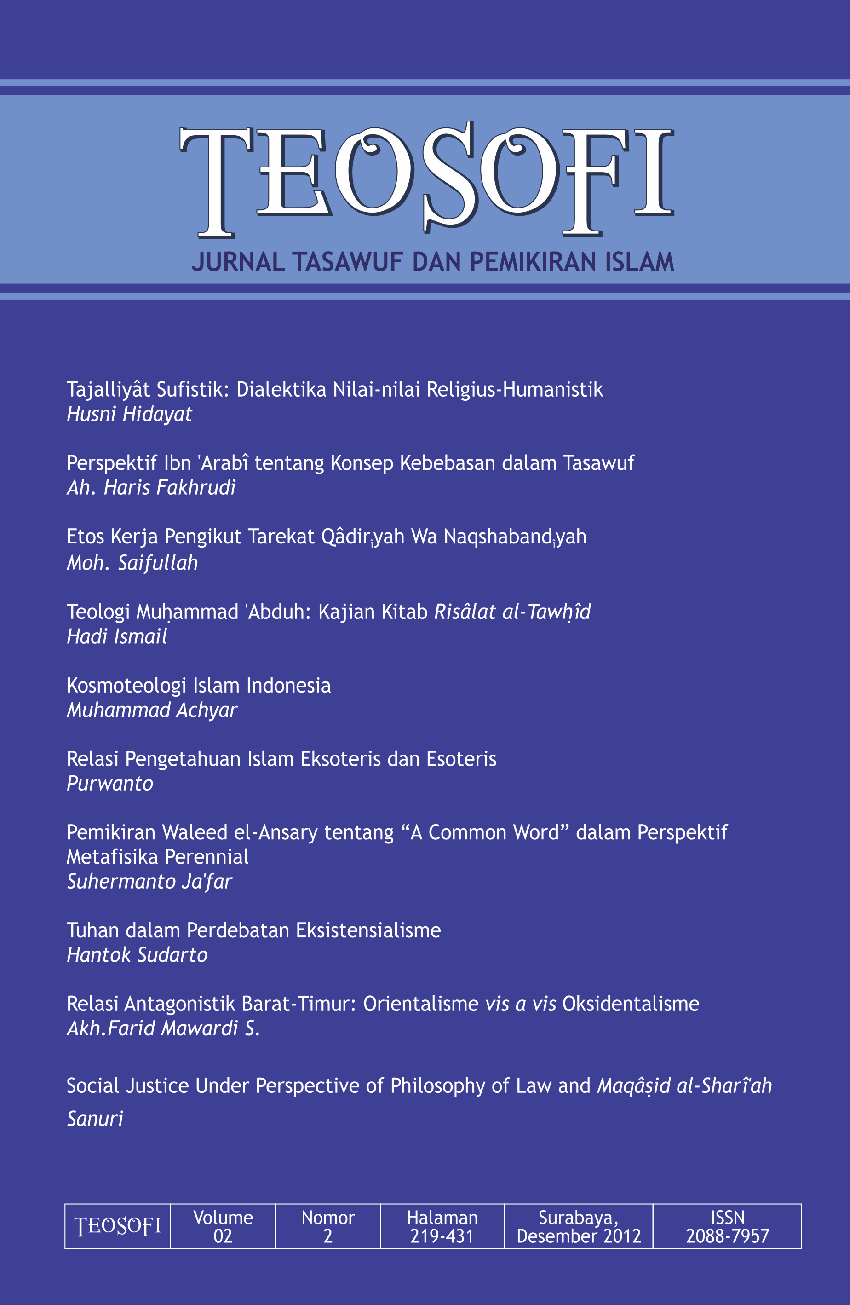Relasi Pengetahuan Islam Eksoteris dan Esoteris
Main Article Content
Abstract
This article scrutinizes Islamic knowledge's relationship focusing on the esoteric realm and exoteric area or what so-called duality of life. Within intellectual treasures of Islam, this dualism has subsequently beaten each other. It is sometimes in the form of friction between the scientific and non-scientific, rational and spiritual, the sacred and the profane, theocentric and anthropocentric. However, when carefully understood, the dualism shares the same nature, namely the outer and inner aspects. The outer is represented by a name, while the inner can only be understood through the process of interpretation. These two aspects are represented by two words: name (outer aspect) and meaning (inner aspect). Therefore, Islam is present, and it attempts to draw both together. As can be observed in this century, the mentality of modern humans seems to be eroded far from religious norms as people have developed science, which leads to religious emptying from its noble values. Therefore, it is important to bring the esoteric realm into modern thought, which tends only to put emphasis on the exoteric aspect.
Downloads
Article Details

This work is licensed under a Creative Commons Attribution-NonCommercial 4.0 International License.
Licensing
© The Author(s). Published by Department of Aqidah and Islamic Philosophy, Faculty of Ushuluddin and Philosophy, Sunan Ampel State Islamic University Surabaya, Indonesia.
This is an Open Access article distributed under the terms of Attribution-NonCommercial 4.0 International (CC BY-NC 4.0).
References
Arnis, Adnin. “Gagasan Frithjof Schoun Tentang Titik Temu Agama-Agama” dalam Islamia, Tahun I, No. 3, Sepetember-November, 2004.
Bagus, Lorens. Kamus Filsafat. Jakarta: PT Gramedia Pustaka Utama, 2005.
Beck H.L. & Kaptein, N.J.G. Teologi, Ffilsafat Islam dan Tasawuf. Jakarta: INIS, 1988.
Chaplin, J.D. Kamus Lengkap Psikologi, terj. Kartini Kartono. Jakarta: PT. Raja Grafindo Persada, 2005.
Chittick, William C. “Sufism” dalam Oxford Encyclopedia of Islamic Modern World, V.
Fayyûmî (al), Muhammad Ibrâhîm. Târîkh al-Falsafah al-Islâmîyah fî al-Mashriq. Kairo: Dâr al-Thaqâfah, 1991.
Foucault, Michel. The Order of Think: An Archeology of Human Science. New York: Vintage Books, 1994.
Hardiman, Budi F. Melampaui Positivisme dan Problem Modernitas. Yogyakarta: Penerbit Kanisius, 2003.
Kattsoff, Louis O. Pengantar Filsafat, terj. Soejono Soemargono. Yogyakarta: Tiara Wacana, 2006.
Mahmûd, ‘Abd. al-Halîm. al-Tafkîr al-Falsafî fî al-Islâm. Kairo: Dâr al-Ma‘ârif, t.th.
Mahzar, Armahedi. Merumuskan Paradigma Sains dan Teknologi Islam, Revolusi Integralisme Islam. Bandung: Mizan, 2004.
Nasr, Seyyed Hosein. Islamic Life and Thought. London: George Allen Unwin, 1981.
-----. Tasawuf: Dulu dan Sekarang. terj. M Thoyibi. Jakarta: Pustaka Firdaus, 1991.
Schuon, Frithjof. Spiritual Perspectives & Human Facts, Pen. P. N. Townsend. Middlesex: Perennial Books Limited, 1987.
-----. The Transcendent Unity of Religions. Wheaton: Theosophical Publising House, 1984.
Shohibuddin, M. “Dekonstruksi; Pembebasan dari Kuasa Teks” dalam Hal of Thought, No. 1, Januari-1999.
Streng, Frederick J. Understanding Religious Life. California: Wadswprth Publishing Company, 1985.
Syari’ati, Ali. Hajj, terj. Anas Mahyuddin. Bandung: Pustaka, 2009.
-----. Man and Islam, terj. Amien Rais. Jakarta: Srigunting, 2001.
Zaqzûq, Mahmûd Hamdî. al-Dîn wa al-Falsafah wa al-Tanwîr. Kairo: Dâr al-Ma‘ârif, 1996.

